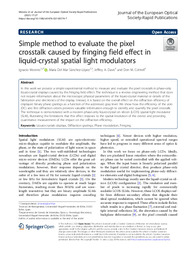Por favor, use este identificador para citar o enlazar este ítem:
https://hdl.handle.net/11000/34249
Simple method to evaluate the pixel crosstalk caused by fringing field effect in liquid-crystal spatial light modulators
Título :
Simple method to evaluate the pixel crosstalk caused by fringing field effect in liquid-crystal spatial light modulators |
Autor :
Moreno, Ignacio
Sánchez López, María del Mar
Davis, J.A.
Cottrell, D.M. |
Editor :
Journal of the European Optical Society-Rapid Publications |
Departamento:
Departamentos de la UMH::Ciencia de Materiales, Óptica y Tecnología Electrónica |
Fecha de publicación:
2021 |
URI :
https://hdl.handle.net/11000/34249 |
Resumen :
In this work we provide a simple experimental method to measure and evaluate the pixel crosstalk in phase-only liquid-crystal displays caused by the fringing field effect. The technique is a reverse engineering method that does not require information about the microscopic physical parameters of the liquid-crystal material or details of the fabrication and electronics of the display. Instead, it is based on the overall effect on the diffraction efficiency of displayed binary phase gratings as a function of the addressed gray level. We show how the efficiency of the zero (DC) and first diffraction orders provides valuable information enough to identify and quantify the pixel crosstalk.
The technique is demonstrated with a modern phase-only liquid-crystal on silicon (LCOS) spatial light modulator (SLM), illustrating the limitations that this effect imposes to the spatial resolution of the device and providing quantitative measurement of the impact on the diffraction efficiency.
|
Palabras clave/Materias:
liquid-crystals displays
diffraction gratings
phase modulation
fringing |
Área de conocimiento :
CDU: Ciencias aplicadas: Ingeniería. Tecnología |
Tipo de documento :
info:eu-repo/semantics/article |
Derechos de acceso:
info:eu-repo/semantics/openAccess
Attribution-NonCommercial-NoDerivatives 4.0 Internacional |
DOI :
https://doi.org/10.1186/s41476-021-00174-7 |
Aparece en las colecciones:
Artículos - Ciencia de los materiales, óptica y tecnología electrónica
|
 La licencia se describe como: Atribución-NonComercial-NoDerivada 4.0 Internacional.
La licencia se describe como: Atribución-NonComercial-NoDerivada 4.0 Internacional.
 La licencia se describe como: Atribución-NonComercial-NoDerivada 4.0 Internacional.
La licencia se describe como: Atribución-NonComercial-NoDerivada 4.0 Internacional.
.png)
